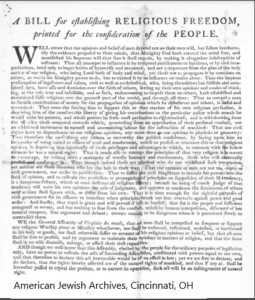American Religious Liberty – Virginia, 1779
Although America was intended as a land of liberty, religious freedom was not always guaranteed. In many colonies and later states, Jews struggled for the right to vote, the ability to serve in the government, and for recognition of their religion as equal before the law. Thomas Jefferson, a strong believer in freedom of religion, drafted the Virginia Bill for Religious Freedom in 1779, and it became law on January 16, 1786. It guaranteed religious freedom for all in Virginia, removing religion as a barrier to any “civil capacities,” and preventing one from being “compelled to frequent or support any religious Worship place or Ministry.” Jefferson considered the bill important enough that alongside of authoring the Declaration of Independence and founding the University of Virginia, it was one of three accomplishments that Jefferson wanted included on his epitaph.

Virginia Bill for Religious Freedom, 1786. American Jewish Archives, Cincinnati, Ohio.

